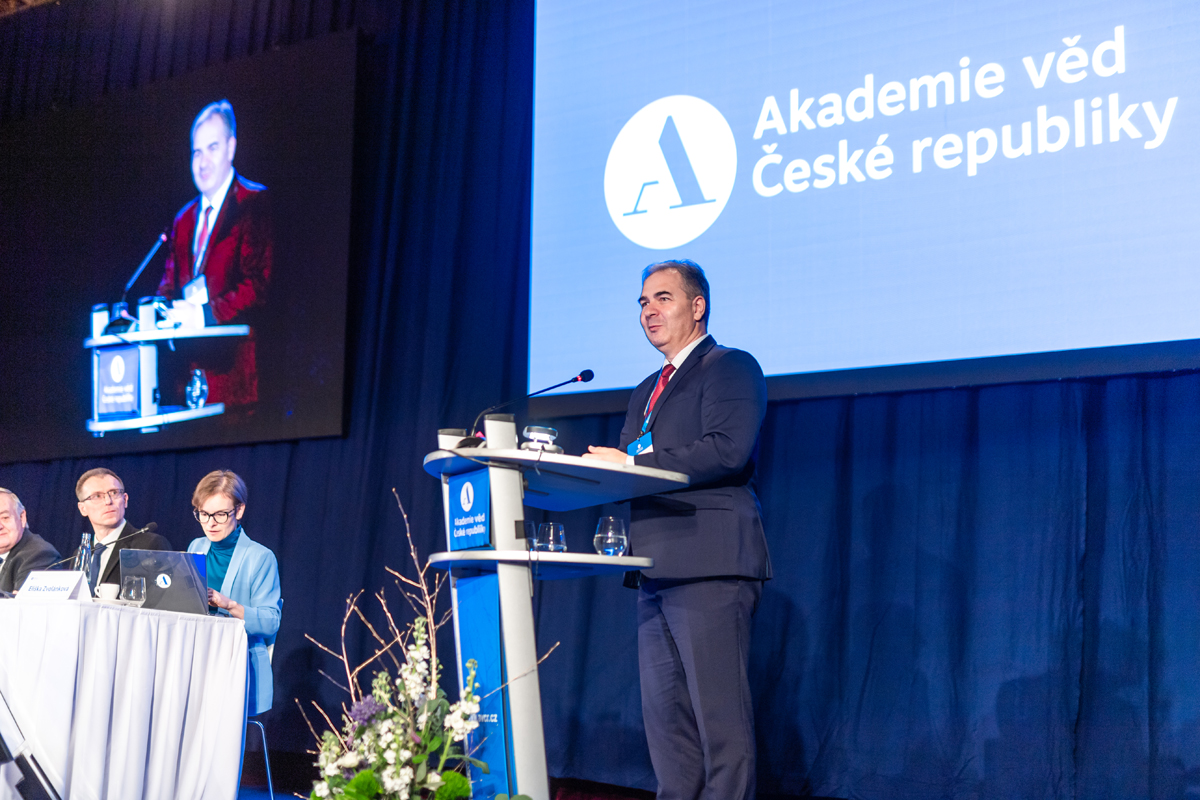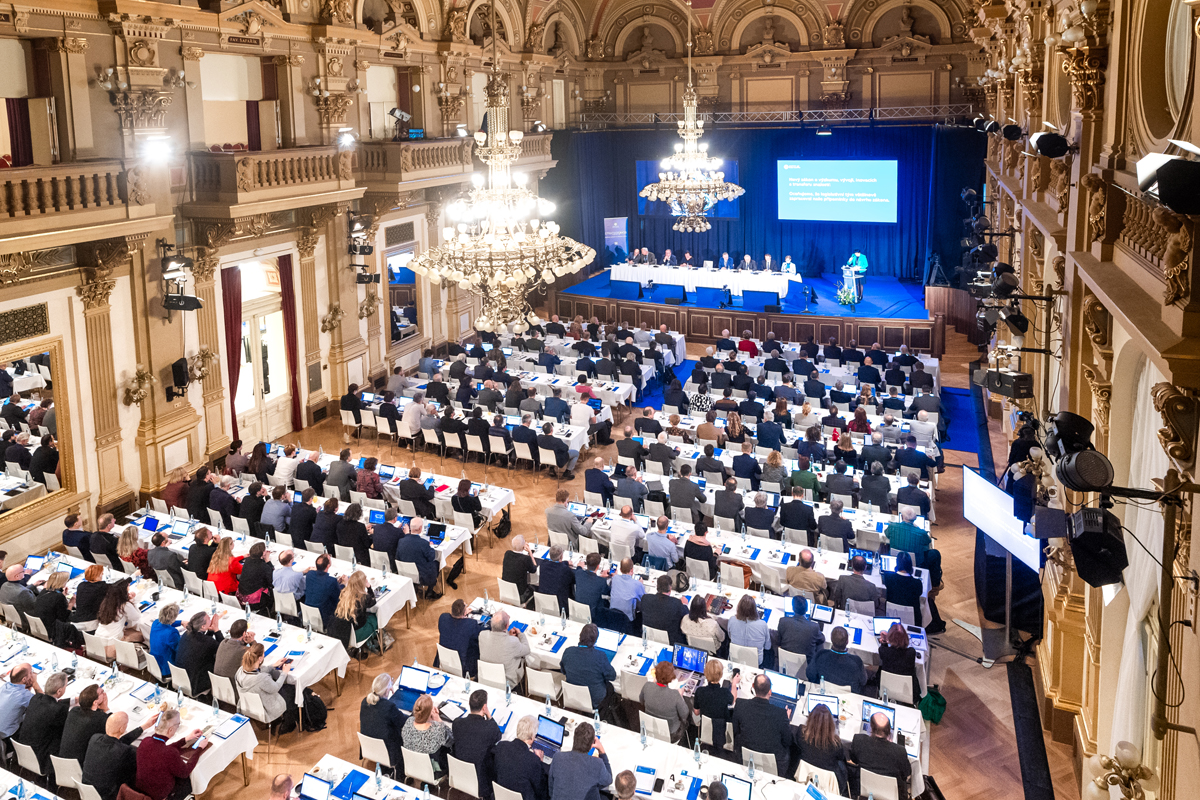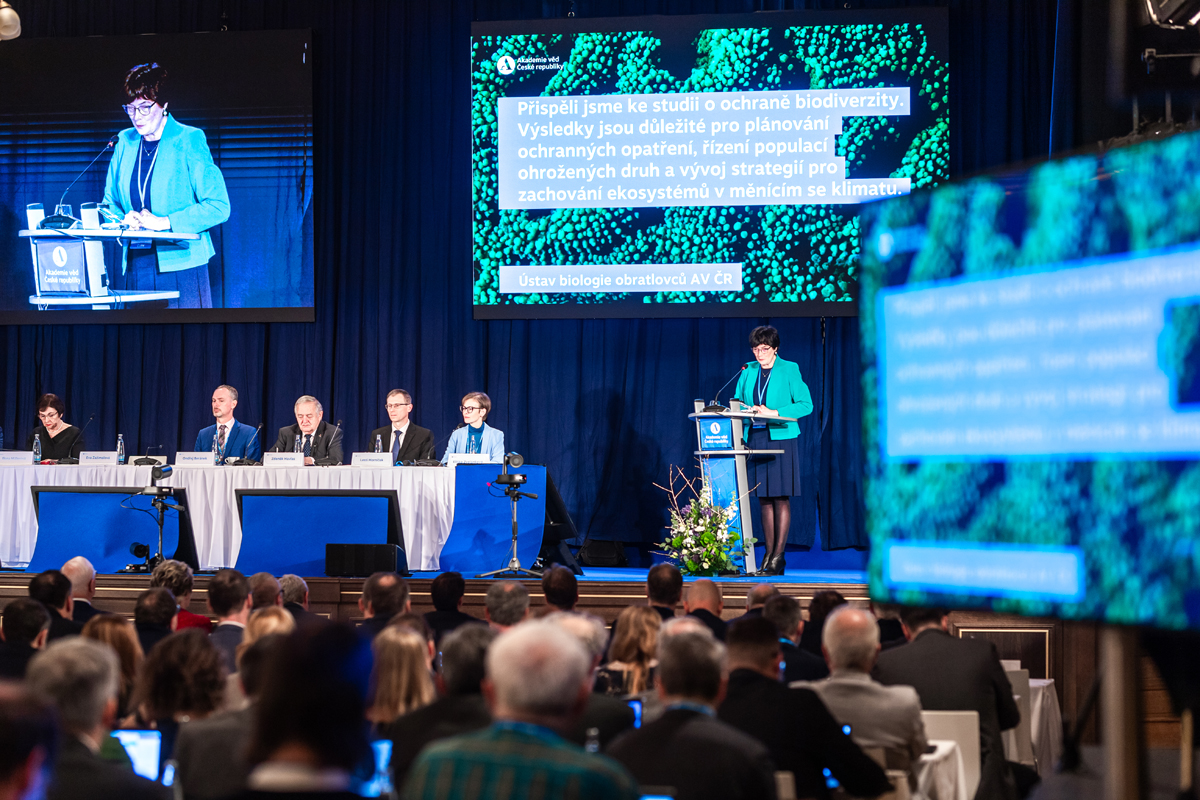
Radomír Pánek nominated for the next President of the CAS
10. 12. 2024
The Academy Assembly has elected Radomír Pánek as the nominee for the President of the Czech Academy of Sciences (CAS) for the 2025–2029 term. Chosen from four candidates, Radomír Pánek from the Institute of Plasma Physics of the CAS secured the majority vote during the 64th session of the Academy Assembly, held on 10 December 2024, at the National House Vinohrady in Prague. The Czech government will now review the nomination, and the President of the Czech Republic will officially appoint the new President of the CAS.
In addition to electing the presidential candidate, the participants of the Academy Assembly are also addressing topics such as the CAS budget, the new “Academy of the Future” support of research excellence program, and the draft of a new law on research, development, innovation, and knowledge transfer. As usual, the session is hosting representatives of the Czech government, scientists, directors of CAS institutes, as well as representatives from Czech universities and other notable guests.
Radomír Pánek could become the next President of the CAS
The main item on the agenda of the December session of the Academy Assembly of the CAS was the election of a nominee for the position of President of the CAS for the 2025–2029 term. With 53% of the votes in the first round, Prof. RNDR. Radomír Pánek, Ph.D. from the Institute of Plasma Physics of the CAS won the nomination, defeating Jiří Plešek from the Institute of Thermomechanics of the CAS, Libor Grubhoffer, Director of the Biology Centre of the CAS, and David Honys from the Institute of Experimental Botany of the CAS. Candidate Pavel Baran from the Institute of Philosophy of the CAS stepped down before the vote took place.

Radomír Pánek at the 64th Academy Assembly of the Czech Academy of Sciences.
“It would make sense for me to speak about my experience and qualities that I would apply in the role of President. However, I primarily want to emphasize that since deciding to run, I have spoken with many of you and taken away one important impression – we are all united by our shared interest in a strong and confident Czech Academy of Sciences,” Pánek said in his speech before the vote. “Thank you for your support and trust. I promise that over the next four years, I will do everything possible to move the Czech Academy of Sciences significantly forward,” he added after winning the nomination.
The Czech government will now review the elected nominee for the position of CAS President, and the President of the Czech Republic will appoint the nominee. Current President of the CAS, Eva Zažímalová, who is serving her second term in office, will hand over her role to her successor on 24 March 2025.
The director of the Institute of Plasma Physics of the CAS, Radomír Pánek, specializes in research on thermonuclear plasma physics and advanced technologies for fusion reactors (tokamaks). In the past, he led the COMPASS Tokamak installation project as well as the COMPASS Upgrade project. Since January 2024, he has served as the General Assembly Chair of EUROfusion, the European Consortium for the Development of Fusion Energy, which coordinates thermonuclear fusion research in Europe, and he is a member of the Scientific and Technical Committee of the European Commission’s EURATOM. From 2020 to 2024, he held two terms as Vice-Chair of the Governing Board of the European agency Fusion for Energy (F4E) in Barcelona. Until 2023, he represented the EU on the Science and Technology Advisory Committee of the ITER project, the world’s largest international research initiative. Pánek also lectures at Charles University and the Czech Technical University in Prague (ČVUT).
Pánek’s key visions include supporting the achievement of excellence in research as well as the teams that are the basis for achieving such results. His goals include increasing the research budget and ensuring competitive salaries. He also seeks to strengthen public and political trust in science. Additional priorities in his program include supporting the next generation of scientists and ensuring conditions that allow researchers to maintain a work–life balance. Pánek plans to focus on research ethics and equal opportunities as well. His aim is to establish equitable partnerships with universities and increase the representation of the Czech Academy of Sciences in European advisory bodies and international organizations. Another priority is streamlining technology transfer processes to eliminate unnecessary red tape.
Budget – stagnation despite growth
The Academy Assembly also discussed the Report on the Economic Situation of the Czech Academy of Sciences, the proposed budget for 2025, and a new program supporting excellence in research called The Academy of the Future. This program includes, among other initiatives, specific support for scientists returning to work after parental leave.
The Czech government has submitted a proposal to the Chamber of Deputies of the Parliament of the Czech Republic to increase the Academy’s budget. If approved, the CAS will receive approximately 300 million CZK more next year, amounting to nearly 8 billion CZK from the state budget. Furthermore, the Czech Minister for Science, Research, and Innovation Marek Ženíšek successfully negotiated an increase in the overall budget for science and research by roughly 3 billion CZK for 2025.
“According to the Czech Statistical Office and the Ministry of Finance, state budget expenditures on research, development, and innovation relative to gross domestic product will drop by more than 20% next year, compared to 2020,” Eva Zažímalová added. Four years ago, the share of state budget expenditures relative to GDP was 0.65%, while in 2025 it will be 0.51%. According to Zažímalová, this means that the additional three billion CZK allocated to the science budget have merely halted further declines in these expenditures. “Our shared ambition should therefore be to significantly increase this proportion to bring us closer to scientifically and technologically advanced countries,” the President of the CAS emphasized.
The new law sparks both hope and concern
The President of the CAS also addressed the draft of the new law on research, development, innovation, and knowledge transfer. She pointed out that the legislative team of the Minister for Science, Research, and Innovation incorporated some of the Academy’s suggestions. For instance, the concept of a unified information system for research, development, and innovation was scratched; it has now been carried over from the bill to a government regulation with more realistic parameters. An explanatory memorandum now explicitly specifies systemic support for the Academy’s operational costs, meaning the Academy no longer needs to conduct international collaborations solely with the approval of the Czech Ministry of Education, Youth, and Sports.
However, not all of the Academy’s suggestions were reflected in the draft. Concerns remain regarding sections that could undermine scientific autonomy and increase red tape. This includes provisions related to the concept of funding providers (koncepce poskytovatele) – such as the Czech Academy of Sciences – that require approval from the Czech government. “Under certain circumstances, this mechanism could represent a significant tool for governmental influence. It allows the government to interfere with the structure of research funding providers, which could be problematic if the autonomy of scientific institutions and academic freedom are not respected,” Zažímalová emphasized.
Further concerns are directed at the legal provisions requiring funding providers, in their decisions to grant institutional support, to specify conditions for the research focus that the recipients must meet. Any restrictive conditions could severely limit the necessary dynamism of research. “I am hopeful, however, that through joint efforts, we will ultimately ensure that the law effectively supports science, research, and innovation in our country,” the President of the CAS concluded.
First Vice-President of the Czech Senate Jiří Drahoš shared a similar view. “I hope the law will be finalized in a way that supports the development of science while simultaneously reducing bureaucracy, which was in fact one of its declared objectives,” he noted, adding that there are no rational grounds for increasing oversight of scientific activities.
Academy of the Future
Martin Bilej from the Academy Council of the CAS introduced a new program aimed at supporting CAS institutes called Academy of the Future. The program includes specific support for researchers returning to work after parental leave. It is currently pending approval by the Research, Development and Innovation Council, and further budget negotiations are also underway.
“The Academy of the Future builds on our current programs supporting excellence in research, such as the Academic Award, Lumina Quaeruntur, the Wichterle Award, and others,” Bilej explained. He added that the program has three priority areas: fellowships, returns (including both the return of researchers from parental leave and those returning from abroad), and research groups.

The 64th session of the Academy Assembly was held at the National House Vinohrady in Prague.
International projects in turbulent times
Eva Zažímalová highlighted the opening of the Dioscuri Centers of Scientific Excellence in mid-May 2024 by leaders of the Max Planck Society, the Czech Academy of Sciences, and the German and Czech ministries of education. The program supports talented young scientists under the patronage of the Max Planck Society. In the Czech Republic, three centers have been opened. Two are located at the Institute of Physics of the CAS: one led by spincaloritronics expert Helena Reichlová, and the other by nano-optics specialist Barbora Špačková.
The President of the CAS also mentioned the Researchers at Risk Fellowship program, which supports researchers whose scientific work is at risk due to threats of war, persecution, human rights violations, and other life-threatening dangers. This year, it allocated approximately CZK 47 million to assist 37 researchers from Ukraine and other parts of the world, such as Sudan, Uganda, and Afghanistan.
“The recent events demonstrate that we are living in turbulent times – which not only affect international relations but also science, research, innovation, and their continuity,” noted Czech Deputy Minister of Foreign Affairs Jiří Kozák. He added, “Our aim now is to strengthen the presentation of Czech science abroad and the internationalization of universities, institutions, companies, and other entities.” Kozák also highlighted a memorandum of cooperation between the Czech Academy of Sciences and the Czech Ministry of Foreign Affairs, which will enhance the support of science and research in an international context.
Global research at the Academy
Eva Zažímalová also highlighted other notable achievements of the CAS. Karel Žídek from the Institute of Plasma Physics of the CAS, Tomáš Pluskal from the Institute of Organic Chemistry and Biochemistry of the CAS, Martin Fotta from the Institute of Ethnology of the CAS, and Elisabeth Hehenberger from the Biology Center of the CAS recently received European Research Council (ERC) Consolidator Grants. This marked a significant success for the Academy, which secured as many ERC Consolidator Grants as the University of Oxford and outperformed institutions like the University of Cambridge.
Tomáš Jungwirth from the Institute of Physics of the CAS won the Czech Head national award for his extraordinary contributions to spintronics research. His team was successful in directly experimentally demonstrating altermagnetism, which opens up new possibilities for advanced technologies, such as machine learning and artificial intelligence.
Vice President of the CAS Ilona Müllerová accepted the Award of the Technology Agency of the Czech Republic on behalf of the Institute of Scientific Instruments of the CAS, recognizing the Center for Electron and Photon Optics project. This initiative connects tech companies, CAS institutes, and universities.
Knowledge and tech transfer activities within the PRAK program, managed by the CAS Transfer Center (CETAV), are showing considerable progress. In 2023, the program supported ten selected projects, and this year another 23 have received recommendations. The number of spin-off companies associated with CAS institutes is also steadily increasing, currently there are nine. The growing significance of transfer activities is also evidenced by 17 licensing agreements signed with industrial partners this year. A major milestone in this area is the “Concept for the Development of Transfer in Humanities and Social Sciences,” currently under review by the CAS Academy Council.
Malnutrition remains a severe issue, particularly in developing countries, with fatal consequences in childhood. Researchers from the Institute of Microbiology of the CAS, working with Czech and international colleagues, are investigating a specific bacterial strain that may offer a solution. As part of the “Talking to Microbes” project, supported by the Johannes Amos Comenius Programme (OP JAK), they discovered that administering specific bacteria or their components to malnourished children could help maintain growth continuity.

President of the CAS, Eva Zažímalová, spoke of the successes of CAS researchers.
Science for the public and state administration
A significant agenda of the Czech Academy of Sciences is its Strategy AV21. At an October conference celebrating ten years since its founding, coordinators of the Strategy AV21 research programs presented results from projects such as Space for Humankind, Foods for the Future, and Society in Motion and Public Policy.
“I am pleased that they have established successful cooperation with many academic, commercial, and public entities while also engaging in grant and international scientific collaborations,” Zažímalová mentioned. “The Czech Academy of Sciences has increasingly positioned itself as an institution that supports interdisciplinary and interinstitutional research on socially relevant topics,” added Jiří Drahoš, who was CAS President at the time of the Strategy’s creation.
The next Academy Assembly session is scheduled for 18 March 2025, when new members of the Academy Council and the Science Council for the 2025–2029 term will be elected.
Selected documents from the 64th Academy Assembly session, including the report on the economic situation and the proposed 2025 budget, are available (in Czech) on the Czech Academy of Sciences website.
What is the Academy Assembly?
The Academy Assembly is the supreme self-governing body of the Czech Academy of Sciences (CAS). It consists of representatives of the CAS institutes, their directors, and other members of academic and public institutions, as well as the industrial community. The Academy Assembly is responsible for executive decisions concerning the CAS structure, the evaluation of research activities, the budget and any research conditions. It holds plenary sessions biannually.
Written by: Zuzana Dupalová, External Relations Division, CAO of the CAS, drawing on the CAS press release
Translated and prepared by: Tereza Novická, External Relations Division, CAO of the CAS
Photo: Jana Plavec, External Relations Division, CAO of the CAS
 The text and photos are released for use under a Creative Commons licence.
The text and photos are released for use under a Creative Commons licence.
Read also
- New record set for neutrino mass: one million times less than an electron
- On the trail of the endangered little owl: searching for newly hatched owlets
- Teen scientist breaks barriers: No child is a lost cause
- The Czech Academy of Sciences has appointed its new leadership for 2025–2029
- Literature is tied to its historical context. How can we read between the lines?
- Radomír Pánek: The Academy must be united, strong, and proactive
- A springtime booster: The healing potential of tree buds
- A novel compound that protects bone cells may benefit diabetic patients
- New interactive exhibition at the CAS showcases materials shaped by genius ideas
- Leaf growth, root formation, and reproduction – Look to hormones for the answer
The Czech Academy of Sciences (the CAS)
The mission of the CAS
The primary mission of the CAS is to conduct research in a broad spectrum of natural, technical and social sciences as well as humanities. This research aims to advance progress of scientific knowledge at the international level, considering, however, the specific needs of the Czech society and the national culture.
President of the CAS
Prof. Eva Zažímalová has started her second term of office in May 2021. She is a respected scientist, and a Professor of Plant Anatomy and Physiology.
She is also a part of GCSA of the EU.